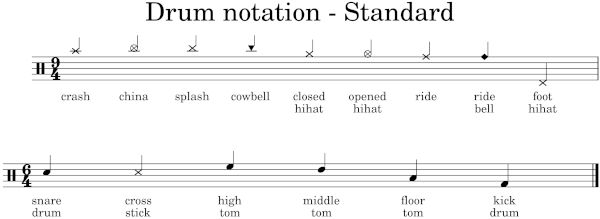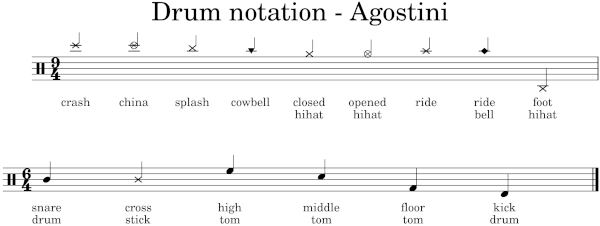What do you want to know?
What is the drum sheet music notation?
We support two types of notation: standard and Agostini. By default, the standard notation is used, but you can change it on your account page. Drumming notation is different from other instruments, and it is quite simple to understand. Each sound has a specific note shape and placement on the staff:


What types of recording? What types of drumming?
Our goal is simple: Every. single. drum. recording!
However, we're not quite there yet. Currently (in beta version), it works best on "modern" pop/rock/metal studio recordings.
First, when we say drums, we mean the common drum kit: a few cymbals, a handful of toms, the kick and the snare drums. Second, the algorithms are using the audio recording only, which means that the sounds you don't hear will not appear in the sheet music. The sounds you can hardly distinguish may not be recognised properly. And lastly, as we're currently focusing on acoustic drums, electronic drum sounds may not be detected (eg, strange clicks, hand claps, strangely pitched toms, etc.).
During the beta, the transcription will have a certain amount of errors. It is most likely going to work on "modern" studio recordings only, as drums in live, phone, or old recordings are usually harder to hear and usually have problematic noises. As for drumming styles, we currently do not annotate flams and drags, as well as dynamics (accents, ghost notes). Every hit is written as a normal note. We do attempt to detect tempo and signature changes within the song, however some drumming styles are definitely challenging. In these rare cases, we will probably not transcribe it properly, for now.
How accurate is it?
We strive for it to be exactly like the recording but we're still in beta, so it's unfortunately not yet. However it's often fine enough to start learning a song. It would be tempting to say that our algorithms are state-of-the-art, but considering there's not much research on realistic acoustic drum transcription nor any benchmark, it would be disingenuous. Our algorithm is simply the best all around by quite a margin. Tell us if you know of any software that seriously tries to have proper drum transcriptions.
Can you edit the transcription?
Yes, with the MuseScore file in extra. MuseScore is a free and open source software for sheet music editing. You can add or remove notes, bars and more, in less than a few minutes.
You can download it for free: https://musescore.org/en/download
Can you share the transcription online?
No, the transcriptions are property of Drumscrib. Besides, how would you support artists by freely sharing it? That's one of the main goals of Drumscrib, making accurate drum transcriptions cheaply available while helping the authors.
Why a beta version?
Long story short, the amount of errors isn't low enough to call it a a final version, but the transcriptions can already be really useful to start playing on songs, and you directly support the development for improving the service. If a transcription is completely messed up, you can choose to wait and you'll be able to have a better version for free when we improve our algorithms (working full-time on it), or you can ask for another transcription, but we don't accept refunds (except for extra files if unusable) during the beta.
Why not a free service?
The current algorithms took years of research and development working full-time and we haven't finished working on improving the transcription quality. Even if you don't see improvements every day, we are literally working on it every single day. You also pay for us to be able to maintain the service, and most importantly, we're looking for making each purchase directly support the songwriters.
What about drum part writers?
You know, there is one thing that bothers us... What if a drummer who wrote and played drums on an album is currently getting a revenue stream by selling his sheet music for his drum parts. And suddenly, because of us, his revenue stream drops. We don't like this thought whatsoever. We actually want quite the opposite to happen, we want drum part writers to have an extra-income based upon each transcription sale on drumscrib.com. For now, nothing is set up yet, but we have already contacted four of the largest music publishing companies.